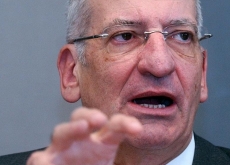War of words breaks out in government

A row has broken out in Switzerland over whether the number of minority-language speakers in senior civil service positions should be increased.
Supporters say it is crucial that top jobs in the federal administration are shared out proportionally in a multilingual society.
The latest controversy over whether speakers of the minority languages – French, Italian and Romansh – are discriminated against came after the appointment of two members of the majority German-speaking population to high-ranking posts in the Federal Chancellery in April.
The choice of Oswald Sigg, in particular, for the post of spokesman and vice-chancellor drew fire.
Sigg replaces Achille Casanova, a native Italian speaker, whose departure means there are now no representatives from the Italian-speaking canton of Ticino at a senior level in government administration.
The move was also sharply criticised by the French-speaking interior minister, Pascal Couchepin.
Pact
Couchepin said that Swiss Germans – who make up almost two thirds of the Swiss population – and the centre-left Social Democrats had formed a pact to exclude candidates from the minority language regions.
French-speakers make up 20 per cent of the Swiss population while Italian-speakers comprise 6.5 per cent. Romansh, a language based on Latin, is spoken by only 0.5 per cent of Swiss.
Couchepin stressed that democracy was not just about numbers, it also meant respect for minorities and certain values.
There were just as many qualified French and Italian-speaking candidates for high-level posts as German-speakers, he said.
Ongoing controversy
This is not the first time that the issue has come up for debate. Before this latest round of appointments, parliamentarians Jean Studer and Didier Berberat had already submitted proposals to parliament calling for the adequate representation of language communities in the senior civil service.
Studer’s motion was accepted by the Senate on Tuesday.
“There are fewer and fewer French- and Italian-speaking managers in government administration,” Studer told swissinfo before the vote. “We must wake up to this in Switzerland.”
Studer is calling for suitably qualified French- and Italian-speaking candidates to take precedence over German-speaking ones until “the language communities are represented according to their size in the population”.
The proposal comes despite the fact that since 2000 the proper representation of language groups has been enshrined in a law on government personnel.
“This [law] is unfortunately not enough,” said Studer, whose proposal has also been accepted by the cabinet.
German-speaking men out
However, the promotion of women and members of language minorities has led to worries in some quarters that German-speaking men will be ruled out of top government jobs in the future.
This was effectively confirmed by Annemarie Huber-Hotz, the head of the Chancellery, in a recent interview with the NZZ am Sonntag newspaper. “One must accept that this group will have no chance,” she said.
She is convinced that this will help heighten awareness of the problem of language minorities in government among the German-speaking population.
But even this policy might run into problems. According to legal experts, concentrating on women and language minorities at the expense of others might go against the Swiss constitution, which forbids any discrimination on the grounds of sex or language.
swissinfo, Christian Raaflaub
Swiss-German Oswald Sigg was elected spokesman and vice-chancellor at the end of April.
His appointment added fuel to the debate over whether there are enough representatives from the language minorities – French, Italian and Romansh – in the senior civil service.
Two proposals, which call for minority-language candidates to get preference over German-speakers for such jobs, have been submitted to parliament.

In compliance with the JTI standards
More: SWI swissinfo.ch certified by the Journalism Trust Initiative












You can find an overview of ongoing debates with our journalists here . Please join us!
If you want to start a conversation about a topic raised in this article or want to report factual errors, email us at english@swissinfo.ch.